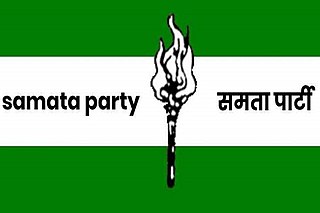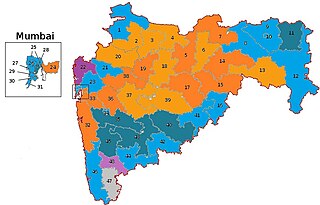The National Democratic Alliance (NDA) is a centre-right to right-wing conservative Indian political alliance led by the right-wing Bharatiya Janata Party (BJP). It was founded in 1998 and currently controls the government of India as well as the government of 15 Indian states and one Union territory.

The Samata Party (SAP) is a political party in India, initially formed in 1994 by George Fernandes and Nitish Kumar, now led by Uday Mandal its National President. Samata Party once launched Nitish Kumar as the Chief Minister of Bihar. It was an offshoot of the Janata Dal, with the alleged casteism of the parent party being the reason given for the split. The party has socialist leanings, and at one point wielded considerable political and social influence in North India, particularly in Bihar. In 2003 most Samata Party members joined Janata Dal (United). Only a faction led by MP Brahmanand Mandal remained in the Samata party and continued to use the party name and symbols.

General elections were held in India in four phases between 20 April and 10 May 2004. Over 670 million people were eligible to vote, electing 543 members of the 14th Lok Sabha. Seven states also held assembly elections to elect state governments. They were the first elections fully carried out with electronic voting machines.
The United Progressive Alliance (UPA) is a centre-left political alliance in India led by the Indian National Congress (INC). It was formed after the 2004 general election with support from left-leaning political parties when no single party got the majority. The UPA subsequently governed India from 2004 until 2014 before losing power to their main rivals, the BJP-led NDA. The UPA currently rules seven states of India.

In United Andhra Pradesh, the general elections and state assembly elections were held simultaneously. In both, the ruling Telugu Desam Party-Bharatiya Janata Party (TDP-BJP) combine was routed. BJP could not win a single seat. The result was a landslide victory for the United Progressive Alliance which won 34 out of 42 seats, which reflects the state elections that occurred before the general elections, where National Democratic Alliance (NDA) member, TDP, was defeated soundly by Y.S. Rajasekhara Reddy and the Indian National Congress. Alliance with CPM and CPI helped the Congress party. Congress had contested in alliance with the communist parties and the TRS.

General elections were held in India in five phases between 16 April 2009 and 13 May 2009 to elect the members of the 15th Lok Sabha. With an electorate of 716 million, it was the largest democratic election in the world until being surpassed by the 2014 general election.

General elections were held in India in nine phases from 7 April to 12 May 2014 to elect the members of the 16th Lok Sabha. With 834 million registered voters, they were the largest-ever elections in the world until being surpassed by the 2019 elections. Around 23.1 million or 2.7% of the total eligible voters were aged 18–19 years. A total of 8,251 candidates contested the 543 elected Lok Sabha seats. The average election turnout over all nine phases was around 66.40%, the highest ever in the history of Indian general elections.

The Indian general election, 2009 in Maharashtra were held for 48 seats with the state going to polls in the first three phases of the general elections. The major contenders in the state were the United Progressive Alliance (UPA) and National Democratic Alliance (NDA). UPA consisted of the Indian National Congress and the Nationalist Congress Party whereas the NDA consisted of the Bharatiya Janata Party and the Shiv Sena. The Shiv Sena contested on 22 seats in the state and the BJP over 25 seats . Similarly, the NCP contested on 21 seats and the Indian National Congress contested on 25 seats . Other parties in the fray included the Maharashtra Navnirman Sena (MNS), Bahujan Samaj Party which fielded candidates on 47 seats, and the Fourth Front. The MNS which was contesting its first general elections fielded candidates on 11 seats in the state.

Jana Sena or Jana Sena Party (JSP) is an Indian political party based in the states of Andhra Pradesh and Telangana. It is founded by Telugu actor, Pawan Kalyan on 14 March 2014.

The 2014 Indian general election in Maharashtra was held in three phases on 10, 17 and 24 April 2014.
Bharath Dharma Jana Sena (BDJS) is a political party in India. Thushar Vellappally is the current national president of BDJS. BDJS is a constituent of National Democratic Alliance in Kerala.

General elections are expected to be held in India during April and May 2024 to elect the members of the 18th Lok Sabha.

The 2019 Andhra Pradesh Legislative Assembly elections were held in the Indian state of Andhra Pradesh on 11 April 2019 for constituting the fifteenth legislative assembly in the state. They were held alongside the 2019 Indian general election.

The 2019 Maharashtra Legislative Assembly election was held on 21 October 2019 to elect all 288 members of the state's Legislative Assembly. After a 61.4% turnout in the election, the ruling National Democratic Alliance (NDA) of the Bharatiya Janata Party (BJP) and Shiv Sena (SHS) won a majority. Following differences over the government formation, the alliance was dissolved, precipitating a political crisis. Since a council of ministers had not been formed after no party could manage to form the government, President's rule was imposed in the state. On 23 November 2019, Devendra Fadnavis was sworn in as the Chief Minister and Ajit Pawar was sworn in as Deputy Chief Minister. However both of them resigned on 26 November 2019 before the floor test and on 28 November 2019, Shiv Sena, NCP, and Congress formed the government under a new alliance Maha Vikas Aghadi (MVA), with Uddhav Thackeray as the Chief Minister. Subsequently, Uddhav Thackeray had to resign due to the Shiv Sena being split which was led by Eknath Shinde. Eknath Shinde is currently the Chief Minister with a BJP-Shiv Sena alliance with BJP's Devendra Fadnavis as the deputy Chief Minister.

The 2019 Indian general election in Maharashtra held in April 2019. These were held for 48 seats in 4 phases; 11 April, 18 April, 23 April and 29 April 2019.

The Bihar Legislative Assembly election was held in three phases through October–November to elect members to the Seventeenth Bihar Legislative Assembly. The term of the previous Sixteenth Legislative Assembly of Bihar ended on 29 November 2020.

The 2021 Kerala Legislative Assembly election was held in Kerala on 6 April 2021 to elect 140 members to the 15th Kerala Legislative Assembly. The results were declared on 2 May.
Elections to local bodies in Kerala were held in December 2020. The polling was held in three stages; on 8, 10 and 14 December, with the votes counted and results announced on 16 December.
Elections to local bodies in Andhra Pradesh are being held in four phases in rural areas (panchayats) in February 2021 viz. 9 February 2021, 13 February 2021, 17 February 2021 and 21 February 2021 covering 13 districts. In the first phase, 29,732 polling stations were set up.
The 2022 Madhya Pradesh panchayat elections will be held in three phases on 25 June, 1 July and 8 July 2022, in the Indian state of Madhya Pradesh. 39,378,502 voters will elect members to 394,233 posts, across all three tiers of the panchayats, and since Electronic voting machines aren't being used, over 575 t of paper is expected to be used during the elections.















